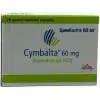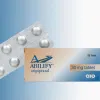No products in the cart.
Return To Shop
Aventyl
Aventyl (nortriptyline hydrochloride) is a tricyclic antidepressant used to treat symptoms of depression, particularly endogenous depression. This medication works by inhibiting the reuptake of neurotransmitters in the brain, helping to restore the balance of chemicals that affect mood and emotional well-being. For patients seeking affordable antidepressant medications, working with qualified healthcare providers ensures proper diagnosis, appropriate dose titration, and access to authentic treatments with comprehensive monitoring for managing depression and related mental health conditions effectively.
- Prescription Required
| Brand | Form | Price | Qty | Action |
|---|---|---|---|---|
| Nortylin Generic | 25mg 30 Tablets | $15.00 |
- Please note all prices are in US dollars
Aventyl (Nortriptyline) – Complete Product Information
Aventyl (nortriptyline hydrochloride) is a tricyclic antidepressant that represents an important therapeutic option for treating various forms of depression. As a secondary amine tricyclic compound, nortriptyline offers a favorable balance of efficacy and tolerability compared to some other medications in its class, making it particularly useful for patients who require antidepressant therapy with manageable side effects.
The medication works primarily by inhibiting the reuptake of norepinephrine and, to a lesser extent, serotonin at nerve synapses in the brain. This action increases the availability of these crucial neurotransmitters, which play essential roles in mood regulation, emotional stability, and cognitive function. Unlike some other antidepressants, nortriptyline also has significant effects on other neurotransmitter systems, including histamine and acetylcholine receptors.
Aventyl is available in multiple formulations including tablets (25 mg) and oral solutions, allowing for flexible dosing and administration options based on individual patient needs. The medication has a relatively long half-life, which permits once-daily dosing in many patients, improving adherence and convenience. The therapeutic blood level range for nortriptyline is well-established (50-150 ng/mL), allowing for precise monitoring and dose optimization.
Clinical Efficacy and Therapeutic Applications: Aventyl is particularly effective for endogenous depression, which tends to be more biologically-based rather than situational or reactive. Clinical studies have demonstrated significant improvement in core depressive symptoms including mood, sleep, appetite, energy levels, and cognitive function. The medication typically requires 2-6 weeks to achieve full therapeutic effects, though some patients may notice improvements earlier.
For patients requiring depression treatment options, Aventyl offers several advantages including well-documented efficacy, established therapeutic monitoring guidelines, and extensive clinical experience. The medication is often considered when patients have not responded adequately to newer antidepressants or when specific symptoms suggest it would be particularly beneficial.
Off-Label Applications and Secondary Indications: Beyond depression, nortriptyline has proven effective for several off-label uses including chronic pain conditions, neuropathic pain, migraine prevention, and attention deficit hyperactivity disorder in certain patients. These applications take advantage of the medication’s effects on different neurotransmitter systems and its ability to modulate pain perception.
The medication has also shown utility in smoking cessation programs and certain anxiety disorders, though these uses require careful consideration of risk-benefit ratios. Some patients with irritable bowel syndrome may benefit from nortriptyline’s effects on gastrointestinal motility and pain perception, demonstrating the medication’s versatility beyond primary psychiatric indications.
Dosing and Administration Considerations: Treatment with Aventyl requires careful individualization and gradual dose titration. Starting doses are typically 25 mg three to four times daily, with gradual increases based on patient response and tolerance. Many patients can eventually be maintained on once-daily dosing, which improves adherence and reduces the risk of missed doses.
Therapeutic drug monitoring is particularly valuable with nortriptyline, as blood levels correlate well with both efficacy and side effects. Doses above 100 mg daily generally require plasma level monitoring to ensure therapeutic effectiveness while avoiding toxicity. The medication should be taken consistently, preferably at the same time each day, and can be taken with or without food depending on individual tolerance.
Important Safety Considerations and Monitoring: Due to its potential for serious cardiovascular and CNS effects, Aventyl requires comprehensive baseline evaluation and ongoing monitoring. Patients with cardiovascular disease, seizure disorders, glaucoma, or urinary retention need particularly careful assessment before treatment initiation.
The medication carries a black box warning regarding increased suicide risk in children, adolescents, and young adults during the initial weeks of treatment. Close monitoring for emergence of suicidal thoughts, unusual behavior changes, or worsening depression is essential, particularly during dose adjustments or treatment initiation.
For patients managing complex mental health conditions, coordination with psychiatrists and mental health specialists is essential. Those exploring accessible depression treatment options should work with qualified healthcare providers to ensure proper diagnosis, appropriate medication selection, and ongoing monitoring for both therapeutic effectiveness and potential complications, as tricyclic antidepressants require specialized expertise and should never be managed without appropriate psychiatric supervision and regular assessment for both mental health status and physical safety parameters.
| Brand | Nortylin Generic |
|---|---|
| Form | 25mg 30 Tablets |
Aventyl can cause various side effects ranging from common anticholinergic effects to serious life-threatening complications. Most side effects are dose-related and can often be managed through careful dose titration and timing adjustments, though some may require discontinuation of therapy.
Common Anticholinergic Side Effects:
- Dry mouth: Reduced saliva production, increased dental problems
- Constipation: Reduced bowel motility, hard stools
- Blurred vision: Difficulty focusing, especially near vision
- Urinary retention: Difficulty emptying bladder completely
- Urinary hesitancy: Delayed initiation of urination
- Drowsiness: Sedation, especially during initial treatment
- Dizziness: Lightheadedness, unsteadiness
- Confusion: Disorientation, particularly in elderly patients
- Memory impairment: Difficulty with short-term memory
Cardiovascular Side Effects:
- Orthostatic hypotension: Blood pressure drop when standing
- Tachycardia: Increased heart rate
- Palpitations: Awareness of heartbeat irregularities
- Arrhythmias: Abnormal heart rhythms
- Heart block: Delayed electrical conduction in heart
- Myocardial infarction: Heart attack (rare but serious)
- Stroke: Cerebrovascular events
- Hypertension: Elevated blood pressure
- Congestive heart failure: Worsening of existing heart conditions
Central Nervous System Effects:
- Confusion: Especially problematic in elderly patients
- Hallucinations: Visual, auditory, or tactile false perceptions
- Disorientation: Loss of awareness of time, place, person
- Delusions: False beliefs or paranoid thoughts
- Anxiety: Increased worry and nervousness
- Restlessness: Inability to remain still
- Agitation: Excessive activity and emotional distress
- Insomnia: Difficulty falling or staying asleep
- Nightmares: Disturbing dreams
- Panic attacks: Sudden episodes of intense fear
- Hypomania: Elevated mood and energy
- Exacerbation of psychosis: Worsening of existing mental health conditions
Neurological Complications:
- Seizures: Convulsions, especially with high doses
- Tremors: Involuntary shaking movements
- Ataxia: Loss of coordination and balance
- Incoordination: Difficulty with fine motor control
- Numbness: Loss of sensation in extremities
- Tingling: Abnormal sensations in hands and feet
- Paresthesias: Pins and needles sensations
- Peripheral neuropathy: Nerve damage in arms and legs
- Extrapyramidal symptoms: Movement disorders
- EEG changes: Altered brain wave patterns
- Tinnitus: Ringing in the ears
Gastrointestinal Effects:
- Nausea: Stomach upset, especially when starting treatment
- Vomiting: Forceful expulsion of stomach contents
- Anorexia: Loss of appetite
- Epigastric distress: Upper stomach pain
- Diarrhea: Loose, frequent bowel movements
- Peculiar taste: Metallic or unusual taste in mouth
- Stomatitis: Inflammation of mouth tissues
- Abdominal cramps: Stomach pain and discomfort
- Black tongue: Discoloration of tongue
- Paralytic ileus: Dangerous bowel obstruction
Allergic and Hypersensitivity Reactions:
- Skin rash: Various types of skin irritation
- Petechiae: Small red or purple spots on skin
- Urticaria: Hives and welts
- Itching: Pruritus and skin discomfort
- Photosensitization: Increased sensitivity to sunlight
- Edema: Swelling of face, tongue, or body
- Drug fever: Elevated temperature from medication
- Cross-sensitivity: Reactions to similar medications
Hematological Effects:
- Bone marrow depression: Reduced blood cell production
- Agranulocytosis: Dangerous drop in white blood cells
- Eosinophilia: Elevated eosinophil count
- Purpura: Purple spots from bleeding under skin
- Thrombocytopenia: Low platelet count
Endocrine and Metabolic Effects:
- Gynecomastia: Breast enlargement in males
- Breast enlargement: In females
- Galactorrhea: Inappropriate milk production
- Libido changes: Increased or decreased sexual interest
- Impotence: Erectile dysfunction
- Testicular swelling: Enlargement of testicles
- Blood sugar changes: Both elevation and depression
- SIADH: Syndrome of inappropriate antidiuretic hormone secretion
- Weight gain: Often significant and persistent
- Weight loss: Less common than weight gain
Hepatic Effects:
- Jaundice: Yellowing of skin and eyes
- Elevated liver enzymes: Signs of liver stress
- Altered liver function: Impaired hepatic metabolism
- Cholestatic liver damage: Bile flow obstruction
Other Notable Side Effects:
- Excessive sweating: Increased perspiration
- Flushing: Sudden redness and warmth
- Urinary frequency: Need to urinate more often
- Nocturia: Nighttime urination
- Weakness: General loss of strength
- Fatigue: Persistent tiredness
- Headache: Various types of head pain
- Parotid swelling: Enlargement of salivary glands
- Alopecia: Hair loss
- Mydriasis: Dilated pupils
- Accommodation disturbance: Eye focusing problems
Serious Life-Threatening Effects:
- Serotonin syndrome: Dangerous reaction with other serotonergic drugs
- Cardiac arrhythmias: Potentially fatal heart rhythm problems
- Seizures: Convulsions requiring emergency care
- Severe hypotension: Dangerously low blood pressure
- Coma: Loss of consciousness
- Respiratory depression: Reduced breathing
Withdrawal Symptoms:
- Nausea: Stomach upset when stopping
- Headache: Pain when discontinuing
- Malaise: General feeling of discomfort
- Dizziness: Balance problems during withdrawal
- Flu-like symptoms: Body aches and fatigue
Age-Related Side Effect Considerations:
- Elderly patients: Higher risk of confusion, falls, cardiac effects
- Young adults (18-24): Increased suicide risk
- Children/adolescents: Not recommended due to safety concerns
Overdose Symptoms:
- Cardiac effects: Arrhythmias, conduction blocks, heart failure
- CNS effects: Seizures, coma, respiratory depression
- Anticholinergic toxicity: Hyperthermia, delirium, dilated pupils
- Cardiovascular collapse: Shock, pulmonary edema
Signs Requiring Immediate Medical Attention:
- Chest pain or irregular heartbeat: Potential cardiac emergency
- Difficulty breathing: Respiratory complications
- Seizures: Any convulsive activity
- Severe confusion or hallucinations: CNS toxicity
- Suicidal thoughts: Increased risk of self-harm
- Severe allergic reactions: Rash, swelling, breathing problems
- Signs of serotonin syndrome: Fever, muscle rigidity, altered mental status
Critical Safety Warning: Aventyl carries a black box warning for increased suicide risk in patients under 25 years old. All patients should be closely monitored for worsening depression, suicidal thoughts, or unusual behavior changes, especially during the first few months of treatment. The medication should never be stopped abruptly due to risk of withdrawal symptoms and potential worsening of depression.
Aventyl (nortriptyline hydrochloride) has specific FDA-approved indications for depression treatment, based on extensive clinical research demonstrating significant efficacy in relieving depressive symptoms when used appropriately under medical supervision:
Primary FDA-Approved Indication:
Depression Treatment:
- Major depressive disorder: Primary indication for symptomatic relief
- Endogenous depression: Particularly effective for biologically-based depression
- Treatment-resistant depression: Option when other antidepressants have failed
- Recurrent depression: Management of repeated depressive episodes
- Severe depression: For patients requiring hospitalization or intensive treatment
Depression Subtypes Particularly Responsive:
- Melancholic depression: With neurovegetative symptoms
- Depression with psychotic features: Often used adjunctively
- Atypical depression: When other treatments unsuccessful
- Seasonal affective disorder: Resistant cases
- Depression in elderly: When carefully monitored
Off-Label Clinical Applications:
Chronic Pain Conditions:
- Neuropathic pain: Diabetic neuropathy, post-herpetic neuralgia
- Chronic pain syndromes: Fibromyalgia, chronic back pain
- Migraine prevention: Reducing frequency and severity
- Tension headaches: Prophylactic treatment
- Temporomandibular joint disorder: Pain and dysfunction management
- Orofacial pain: Various facial pain conditions
- Myofascial pain: Muscle-related pain syndromes
Neurological and Psychiatric Conditions:
- Panic disorder: When SSRIs ineffective or contraindicated
- ADHD: Second-line treatment in specific cases
- Anxiety disorders: Generalized anxiety, social anxiety
- Sleep disorders: Chronic insomnia, sleep maintenance problems
- PTSD: Adjunctive treatment for trauma-related symptoms
Other Medical Conditions:
- Smoking cessation: Aid in tobacco dependence treatment
- Irritable bowel syndrome: Pain and motility management
- Nocturnal enuresis: Bedwetting in older children
- Chronic fatigue syndrome: Symptom management
Dosing Guidelines and Administration:
Standard Adult Dosing for Depression:
- Initial dose: 25 mg three to four times daily
- Dose escalation: Gradual increases based on response and tolerance
- Maintenance dose: 75-150 mg daily in divided doses
- Alternative regimen: Total daily dose given once daily
- Maximum dose: 150 mg daily (higher doses not recommended)
Special Population Dosing:
- Elderly patients: 30-50 mg daily in divided doses
- Adolescents: 30-50 mg daily (not recommended for children)
- Outpatients: Lower doses than hospitalized patients
- Maintenance therapy: Lowest effective dose for extended periods
Therapeutic Drug Monitoring:
- Target plasma levels: 50-150 ng/mL for optimal antidepressant effect
- Monitoring requirements: When doses exceed 100 mg daily
- Steady-state achievement: Typically reached after 5-7 days
- Individual variation: Significant differences in metabolism and response
How long does it take for Aventyl to start working?
Aventyl typically requires 2-6 weeks to achieve full antidepressant effects, though some patients may notice improvements in sleep or appetite within the first 1-2 weeks. The medication needs time to build up in your system and for your brain chemistry to adjust. Dont become discouraged if you dont feel better immediately - continue taking the medication as prescribed and maintain regular contact with your healthcare provider about your progress.
Why do I need blood tests while taking Aventyl?
Blood level monitoring helps ensure youre getting the right amount of medication for optimal effectiveness while avoiding toxicity. The therapeutic range for nortriptyline is well-established (50-150 ng/mL), and blood levels outside this range may be either ineffective or dangerous. Your doctor will typically check levels when doses exceed 100 mg daily or if youre experiencing side effects or poor response to treatment.
Can I drink alcohol while taking Aventyl?
You should avoid alcohol completely while taking Aventyl. Alcohol can dangerous increase the sedative effects of the medication and may worsen depression. The combination can also increase your risk of dangerous side effects including breathing problems, heart issues, and increased suicide risk. Even small amounts of alcohol can cause problems, so its safest to abstain entirely during treatment.
Why is Aventyl not recommended for young people?
Aventyl carries a black box warning because clinical studies showed increased suicide risk in children, adolescents, and young adults (up to age 24) during the first few months of treatment. The FDA found that antidepressants increased suicidal thinking and behavior in this age group compared to placebo. While adults over 24 showed decreased suicide risk, younger patients require extremely careful monitoring if this medication is considered necessary.
What should I do if I miss a dose?
If you miss a dose, take it as soon as you remember unless its almost time for your next dose. Never take a double dose to make up for a missed one. If youre taking multiple doses per day and miss one, you can usually take it when you remember. If youre on once-daily dosing and miss it, take it when you remember but adjust your schedule accordingly. Contact your doctor if you frequently forget doses.
Can I stop taking Aventyl suddenly?
Never stop Aventyl abruptly without medical supervision. Sudden discontinuation can cause withdrawal symptoms including nausea, headache, dizziness, and flu-like symptoms. More importantly, stopping suddenly can cause your depression to return or worsen, potentially increasing suicide risk. Your doctor will create a gradual tapering schedule to safely reduce your dose over several weeks while monitoring your mental health status.
What interactions should I watch for?
Aventyl has many important drug interactions. Never take it with MAO inhibitors, as this can cause dangerous serotonin syndrome. Be cautious with other antidepressants, certain pain medications, blood thinners, and heart medications. Some drugs can increase nortriptyline levels (like quinidine and cimetidine), while others may affect how well it works. Always inform all healthcare providers about your nortriptyline use before starting any new medications.
Why do I feel drowsy, and will it go away?
Drowsiness is a common initial side effect that often improves after 2-4 weeks as your body adjusts to the medication. Taking your dose at bedtime can help use this sedating effect beneficially for sleep. However, be cautious about driving or operating machinery until you know how the medication affects you. If severe drowsiness persists beyond the first month, discuss dose adjustment options with your doctor.
Can Aventyl cause weight gain?
Yes, weight gain is a common side effect of Aventyl and other tricyclic antidepressants. This can occur due to increased appetite, slowed metabolism, and fluid retention. The amount varies between individuals, but gains of 10-20 pounds are not uncommon. Maintaining a healthy diet and regular exercise can help minimize weight gain. Discuss concerns with your doctor, but dont stop the medication without medical guidance, as depression treatment often outweighs weight concerns.
Is it safe to drive while taking Aventyl?
Aventyl can impair your ability to drive safely due to drowsiness, dizziness, blurred vision, and slowed reaction times. Avoid driving for at least the first week of treatment and after any dose increases until you know how the medication affects you. Even after adjusting to the medication, be extra cautious, especially during times of dose changes or if you experience any vision problems or dizziness.
Can I take Aventyl during pregnancy or while breastfeeding?
Aventyl use during pregnancy and breastfeeding requires careful risk-benefit consideration. The medication crosses the placenta and appears in breast milk. While some studies suggest relative safety, there are potential risks to the developing baby. Your doctor will weigh the benefits of treating your depression against potential risks to your baby. Never stop antidepressant medication during pregnancy without medical supervision, as untreated depression also poses risks.
How should I handle the dry mouth side effect?
Dry mouth is one of the most common side effects and can increase your risk of dental problems. Use sugar-free gum or candy to stimulate saliva production, sip water frequently, and consider using artificial saliva products. Maintain excellent oral hygiene with regular brushing and flossing, and see your dentist more frequently for checkups. Avoid alcohol-containing mouthwashes, which can worsen dryness and interfere with your medication.
What should I do about constipation?
Constipation is a common anticholinergic side effect that can be managed with lifestyle changes. Increase your fiber intake through fruits, vegetables, and whole grains. Drink plenty of water throughout the day and maintain regular physical activity. Over-the-counter fiber supplements or stool softeners may help, but check with your doctor before using laxatives. In severe cases, your doctor may need to adjust your dose or prescribe specific treatments.
Can Aventyl be used for conditions other than depression?
Yes, Aventyl is sometimes prescribed off-label for chronic pain conditions, neuropathic pain, migraine prevention, and certain sleep disorders. These uses take advantage of the medications effects on different neurotransmitter systems beyond those involved in depression. However, these applications require careful consideration of risks and benefits, and doses may differ from those used for depression. Always use medications only as prescribed by qualified healthcare providers.
The content on this page has been supplied to telavivpharma.com by an independent third party contracted to provide information for our website. telavivpharma.com relies on these third parties to create and maintain this information and cannot guarantee the accuracy or reliability of the information that has been provided to us.
The drug information provided here is only a summary and does not contain all the list of possible side effects and drug interactions regarding this medication. Be sure to contact your doctor or pharmacist if you have any specific question or concern. If you require any advice or information about the drugs on this page, a medical condition or treatment advice, you should always speak to a healthcare professional.
Please note that not all products, including any referenced in this page, are shipped by our affiliated Israel Pharmacy. We are affiliated with other dispensaries that ship product to our customers from the following jurisdictions: Canada, New Zealand, Turkey and United Kingdom. The items in your order maybe shipped from any of the above jurisdictions. The products are sourced from various countries as well as those listed above. Rest assured, we only affiliate with our authorized dispensaries that procure product through reliable sources.
Required
Send Your Prescription
Secure Payment
No Hidden Fees
Fast Shipping
Typically Under 7 days




Reviews
There are no reviews yet.